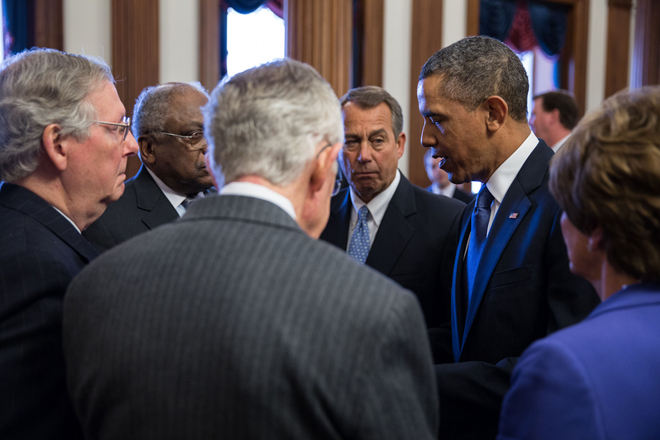Later this week, President Obama will sign a bill that simultaneously averts a government shutdown and locks sequestration into law for the next six months.
During those six months, Obama will try to build a coalition of Democrats and Republicans who can agree to a mix of new taxes and entitlement cuts to replace sequestration. At the same time Republican leaders will grapple with the need to increase the debt limit, and there’s a small chance that these two imperatives will become entwined in a sort of 2011 redux. But ever since GOP leaders relinquished their dangerous and heavy-handed debt ceiling strategy earlier this year, and then resigned themselves to enduring sequestration rather than raise taxes again, it makes more sense that Republicans will increase the debt limit without demanding any real concessions, and sequestration will continue in perpetuity. Maybe its spending caps will simply become the new discretionary spending baseline, and just like that an era of perpetual crisis will come to an end.
That’s a disorienting forecast.
If you’ve been watching Congress closely for the past two years — watching budget fight after budget fight suffocate just about every other major legislative priority — it’s hard to imagine the same partisan arrangement on Capitol Hill setting aside brinksmanship and pursuing a constructive agenda, or perhaps just do nothing at all instead. That this could all end in a whimper.
But it could! And if that’s how things shake out, Obama will have to make peace with a second term fiscal agenda that falls well short of the one he outlined during the campaign. Less tax revenue than he wanted from the wealthy. No new jobs spending. Long-term investments badly underfunded. An Internet weblogging sector deprived of steady “Congressional incompetence” content. The end of the budgeting crisis era will be a silver lining around the fact that Congress has stuck the country with inadequate but fairly permanent economic policies, and probably isn’t capable of doing any better.
So that’s embarrassing.
But as a kind of consolation prize, we’ve learned a lot about what Democrats and Republicans stand for along the way, at least in their current incarnations. Republicans (broadly speaking — there are obviously many exceptions) value Paul Ryan’s economic agenda more than they value their commitments to culture war policies. And to the extent that they’ve accepted the inviability of the entire economic agenda, they prioritize low taxes over their desires to keep military spending permanently high and cut social welfare programs.
Meanwhile we’ve learned that Democrats have a politically adept answer to starve-the-beast legislating — but one that so far hasn’t knocked the GOP off its absolute unwillingness to increase taxes. Democrats stopped being afraid to vote for higher taxes on the wealthy, and essentially established GOP buy-in on higher taxes as an essential requirement for Democratic support for slashing social insurance. On a deeper level, Democrats will prioritize cuts to Medicare providers over beneficiaries, and progressive benefit cuts over broad-based ones. Ironically, the only thing that’s stood in the way of these cuts is Republicans, whose obsession with cutting these programs took us down this road in the first place.
That’s the status quo the election left us. Over time it will probably change. In fact, it has to. Demographic realities mean it could happen sooner than expected. But absent an unexpected, exogenous crisis, or a shift of values within one of the parties, there’s just not a lot of room for a budget deal right now.






